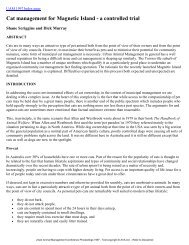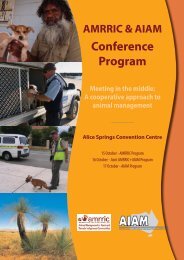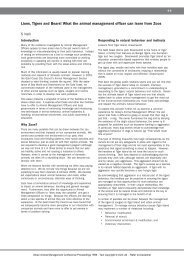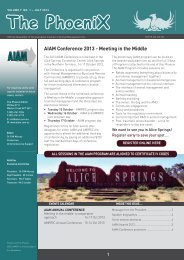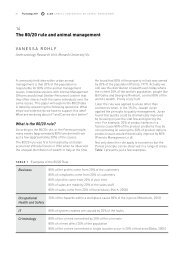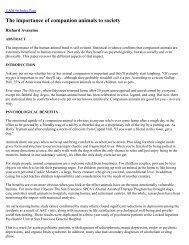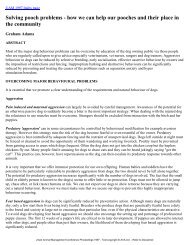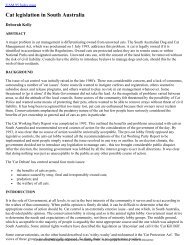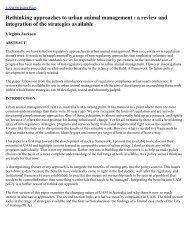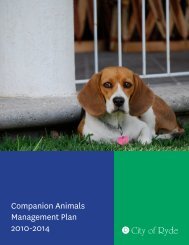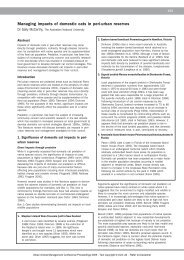Proceedings OF ThE - Australian Institute of Animal Management Inc
Proceedings OF ThE - Australian Institute of Animal Management Inc
Proceedings OF ThE - Australian Institute of Animal Management Inc
You also want an ePaper? Increase the reach of your titles
YUMPU automatically turns print PDFs into web optimized ePapers that Google loves.
32 <strong>Proceedings</strong> 2012<br />
AIAM Annual Conference on <strong>Animal</strong> <strong>Management</strong><br />
“puppy mills” and the connotation is the same. Such<br />
language has no place in matters <strong>of</strong> governance that<br />
should, on the contrary, bear only the hallmarks <strong>of</strong><br />
uncompromised objectivity. As such, the term “puppy<br />
farming” is unhelpful.<br />
There are always going to be some dog breeders who<br />
do the right thing and maintain good standards, and<br />
others that do not. The central problem in attempting<br />
to resolve the “bad” breeder situation lies in where<br />
to draw the line between what is “good” and what is<br />
“bad” dog breeding practice. Though we may clearly<br />
understand the intent, these terms are subjective and<br />
without technical (legal) definition. Promoting good<br />
and eliminating bad may be a nice idea (and a useful<br />
statement <strong>of</strong> broad intent), but it has no merit in a<br />
legal or regulatory sense.<br />
The key<br />
From an <strong>Animal</strong> <strong>Management</strong> perspective, it is<br />
important to remember that the primary focus <strong>of</strong><br />
Local Government is not an animal welfare focus.<br />
The obligatory focus <strong>of</strong> councils (with respect to<br />
animal ownership) is directed at community care<br />
and management through the minimisation <strong>of</strong> public<br />
nuisance and public risk. This does not suggest<br />
for a minute however, that Local Government is<br />
not interested in animal welfare but it does say<br />
that animal welfare is not the jurisdiction <strong>of</strong> Local<br />
Government.<br />
The <strong>Animal</strong> <strong>Management</strong> services that are provided<br />
for the community by local authorities involve three<br />
things: Local laws, the factual findings <strong>of</strong> specifically<br />
trained council <strong>of</strong>ficers, and the application <strong>of</strong><br />
established remedial measures when required.<br />
This reality is <strong>of</strong> great moment (in the context <strong>of</strong><br />
this discussion) in that this is an entirely objective<br />
process. While “subjective” won’t ever cut it, no<br />
matter how passionate the views, “objective” can!<br />
Anecdotally, there is an important perception in<br />
<strong>Animal</strong> <strong>Management</strong> circles that, where animal<br />
control and regulation issues are effectively<br />
addressed by Local Government regulatory<br />
measures, a range <strong>of</strong> animal welfare issues<br />
tend to spontaneously resolve as a direct (default)<br />
consequence <strong>of</strong> this intervention. If routine general<br />
regulatory services together with specific <strong>Animal</strong><br />
<strong>Management</strong> services can be focussed in an effective<br />
way, it can be made impossible for bad breeders to<br />
operate. And hence, another positive animal welfare<br />
outcome can be delivered by Local Government.<br />
Summary<br />
It is worth noting that the Magistrate in court after<br />
that second (successful) property inspection case<br />
did not even ask if I had actually looked in the mouth<br />
<strong>of</strong> any <strong>of</strong> the dogs in question. The emphasis in<br />
evidence was entirely focussed on my qualifications,<br />
how I had kept notes <strong>of</strong> my observations and what I<br />
thought. Perhaps the mandatory training <strong>of</strong> <strong>Animal</strong><br />
<strong>Management</strong> Officers to Cert IV standard is a first<br />
priority for getting better outcomes for councils. With<br />
training comes qualification, and with qualification<br />
comes credibility <strong>of</strong> competence.<br />
• yThere may in fact be no need to have dog<br />
breeders registers as such, provided the facilities<br />
used for breeding <strong>of</strong> dogs are <strong>of</strong> a high and<br />
properly controlled standard.<br />
• yThere may also be no need to even register dog<br />
breeding businesses when any person selling<br />
dogs must mandatorily have a registered<br />
business name and an ABN could be required to<br />
cover any such enterprise.<br />
• yThen, if all newly acquired dogs were required<br />
to be both micro-chipped (to link with their new<br />
owner) and registered to link with the relevant<br />
council database at the point <strong>of</strong> acquisition, the<br />
whole system could be completely controllable<br />
with already existing procedures and capabilities.<br />
Why would any State Government or Local Authority<br />
wish to get tangled up in new animal welfare<br />
oriented legislation that is intended to prevent bad<br />
dog breeding when all the necessary regulatory<br />
processes are already available under existing<br />
jurisdictions?<br />
• yThe full range <strong>of</strong> regulatory functions available<br />
may need better coordination and sharper focus<br />
for this specific problem.<br />
• yThe overall process may require more<br />
pr<strong>of</strong>essionalism, greater consistency and<br />
improved resourcing,<br />
• yBut the mechanisms are probably all there –<br />
already in place and available if the effort is<br />
made.<br />
Concluding remarks<br />
A few lessons from the above personal experience<br />
could be useful for <strong>Animal</strong> <strong>Management</strong> Officers<br />
when they are required to deal with issues<br />
concerning a dog breeding establishment.<br />
• yAn objective and thorough approach is more<br />
likely to be effective in gaining compliance with<br />
regulations and for dispute resolution<br />
• yStandards and guidelines aimed at delivering<br />
good animal management are also likely to<br />
deliver good animal welfare, and should be<br />
applied to all sectors <strong>of</strong> the dog breeding industry<br />
It might be an inconvenient truth for some that many<br />
puppies originate from puppy farms. It should be<br />
noted, however, that there are other types <strong>of</strong> dog



